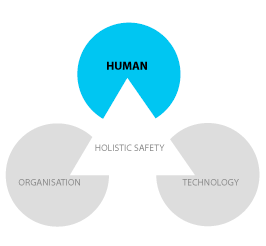What is it?

Non-Technical Skills (‘NTS’) are interpersonal skills which include: communication skills; leadership skills; team-work skills; decision-making skills; and situation-awareness skills. They do not include the technical skills required to get the job done e.g. the technical skill or know-how to operate a machine or conduct a certain operation. However, they complement these technical skills making them more efficient and effective.
Why is it important?
NTS are important because they make human work safer and more efficient. They may not appear to be skills since we apply them to some extent every day. However, when applied well, these skills are invaluable in maintaining system safety and ensuring efficient and effective operations. For example, people often need to work in teams and communicate with one another to get a particular job done. Learned through training and practice, the best operators possess good NTS which enables them to, for example, work well with others and communicate effectively e.g. a worker operating an X-ray machine will be able to work more safely and effectively if they utilise NTS, such as communication and situation awareness.
Where did it come from?
NTS emerged from research into aviation accidents which occurred in the late 1970s, such as the Tenerife airport disaster in 1977. As technology improved, the human contribution to accidents had become more apparent. Rather than there being any technical fault with the aircraft, it became clear from subsequent investigations that things such as poor communication between pilots and air traffic control could be primarily responsible for these crashes. The aviation industry then devoted resources training pilots in what was known as Cockpit Resource Management. Training pilots in these NTS were seen to improve safety. This was then expanded to all flight crew to become what is known today as Crew Resource Management. Applying NTS has been seen as useful in other industries as well. Nuclear power as well as healthcare have implemented training and assessment in NTS to improve safety.
Learn more about the History of safety.
How can I use it in my operations?
An important first step to improve NTS is to learn more about it. The Holistic safety guidelines and Sample questions outline key principles for NTS–see Characteristic 2. You can also consult useful references.
There are several important lessons that should be noted when trying to improve NTS. Initially, organisations should consider the risks of their operations. In some cases, it may be necessary for licence holders to spend significant resources addressing NTS, while in others, it may not be warranted. This is determined by the risk and type of operations the licence holder has. Licence holders should demonstrate that they have made some attempt to determine to what extent NTS are warranted in their operations and its relevance, showing NTS has been given due consideration.
The next step is to identify NTS. Different operations require different NTS. For example, team-work and communication may be more important in some operations (e.g. in work processes which rely on several people) whereas situation-awareness and decision-making may be more important in others (e.g. in operations where people are required to monitor a control panel). These can be identified by observing the work required in the particular operation. Do people need to work in teams? Is safety-essential information communicated frequently? Does decision-making need to be made quickly and under stress and in both expected and unexpected conditions? Answers to these questions may help determine which NTS should be addressed.
Another important point is that NTS are improved through training and practice. Like any other skill, there are both poor and good methods for applying NTS. It can help if employees understand what poor NTS ‘look like’ and how to avoid them e.g. poor communication or leadership methods or styles. Workers should also learn techniques of how to apply good NTS (e.g. good decision-making skills).


